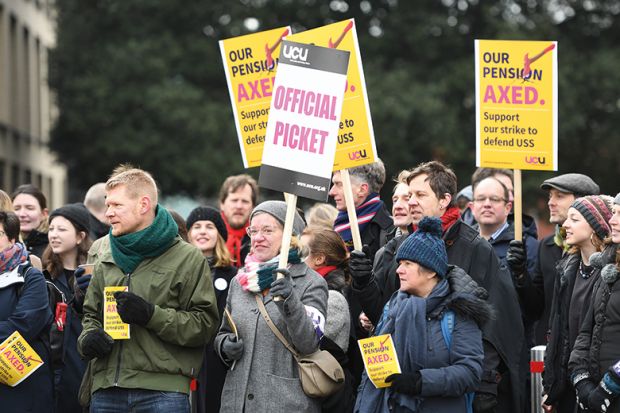This week will see the start of a University and College Union strike of unprecedented size, scale and feeling as union members walk out over an ongoing pensions dispute.
We would rather be teaching.
That one simple fact will tell you a lot more about the current dispute than any number of competing interpretations of defined-benefit and defined-contribution pensions, rates of gilt return and pension schemes liability.
Because many – perhaps most – of the academics I know love their jobs so much that they would probably do them for free.
It’s easy enough to prove: we already do.
From voluntary outreach work with local schools to public lectures, from refereeing and editing academic publications to weekend visit days, from blogging to conference participation, from providing specialist advice to straightforward life advice, much of the work academics do is, in the most generous reading, covered by the vague language at the end of most employment contracts.
A less generous reading is that a large proportion of the work that many academics do is completely unpaid. For too many of us, it happens outside core working hours, receives no official recognition and piles up with no end in sight. Did I mention that many academics have no training or experience in much of this grey work?
Employers have long taken advantage of this.
There is no limit to the number of hours that an academic can be expected to devote to teaching and research in a week, and no limit to the additional responsibilities that can be added to our plates. We are no longer just responsible for our students’ learning; we are now responsible for their well-being. We don’t just teach; we spend hours navigating teaching “tools” with buggy interfaces that take our learning materials and make them the intellectual property of the institution we are working for.
“Institution”: I won’t call it the “university”.
The university, as my colleague Madhu Krishnan often reminds us, is “us”: it is the people who work within higher education and our students. The same forces that have driven the introduction of student tuition fees, and the raising of fees to more than £9,000 a year, are behind this latest attempt to push the Universities Superannuation Scheme pension fund off the universities’ books.
This is why I say that you don’t need to understand the technicalities of the pensions dispute to recognise what is happening in universities up and down the country. You only need to know how these institutions – jerked from left to right by the government’s zigzags on higher education policy – are surviving at the expense of both staff and students.
You only need to think about what it means that so many institutions are threatening to withhold wages from staff who work to contract during the dispute.
Is this legal? Yes. It turns out that if university staff do the job they are paid to do, their employers can dock their pay for refusing to do all the things that we normally do for free.
But a better question is whether it is a good idea.
The money that institutions save will disappear into the hole where the “university” should be – a reminder that they do not stand for staff, or for students.
And these attempts to play hardball are having only one effect: we are seeing greater support for the union than ever before, and increasing signs that students recognise that the fight for the university must be fought by staff and students together.
Well, at least the universities are teaching us something.
Will Pooley is a lecturer in 19th- and 20th-century European history at the University of Bristol.
Register to continue
Why register?
- Registration is free and only takes a moment
- Once registered, you can read 3 articles a month
- Sign up for our newsletter
Subscribe
Or subscribe for unlimited access to:
- Unlimited access to news, views, insights & reviews
- Digital editions
- Digital access to THE’s university and college rankings analysis
Already registered or a current subscriber?










